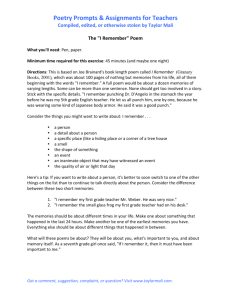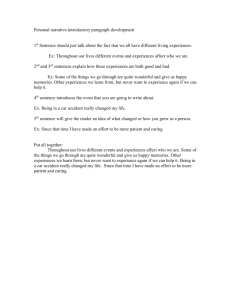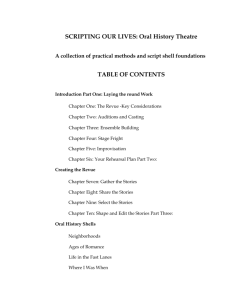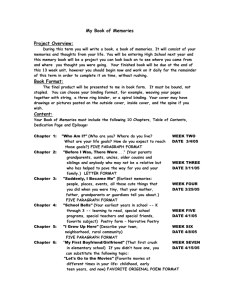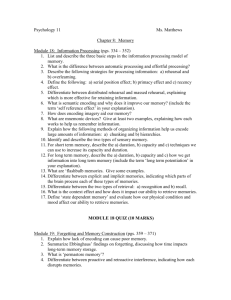2010 Rosh Hashanah - Cantor Brian Reich
advertisement
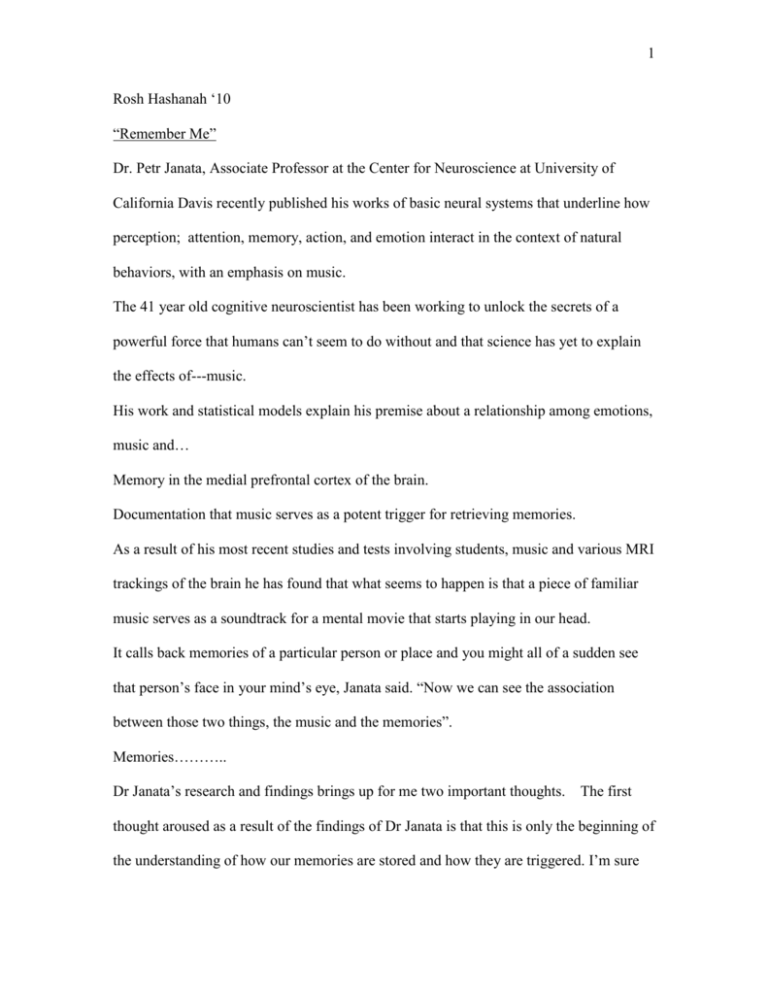
1
Rosh Hashanah ‘10
“Remember Me”
Dr. Petr Janata, Associate Professor at the Center for Neuroscience at University of
California Davis recently published his works of basic neural systems that underline how
perception; attention, memory, action, and emotion interact in the context of natural
behaviors, with an emphasis on music.
The 41 year old cognitive neuroscientist has been working to unlock the secrets of a
powerful force that humans can’t seem to do without and that science has yet to explain
the effects of---music.
His work and statistical models explain his premise about a relationship among emotions,
music and…
Memory in the medial prefrontal cortex of the brain.
Documentation that music serves as a potent trigger for retrieving memories.
As a result of his most recent studies and tests involving students, music and various MRI
trackings of the brain he has found that what seems to happen is that a piece of familiar
music serves as a soundtrack for a mental movie that starts playing in our head.
It calls back memories of a particular person or place and you might all of a sudden see
that person’s face in your mind’s eye, Janata said. “Now we can see the association
between those two things, the music and the memories”.
Memories………..
Dr Janata’s research and findings brings up for me two important thoughts.
The first
thought aroused as a result of the findings of Dr Janata is that this is only the beginning of
the understanding of how our memories are stored and how they are triggered. I’m sure
2
that someday soon, through science, we will prove that our sense of smell, site, the way
things feel stimulates our brains to produce mental movies in our mind.
Memories…..
Our emotions are triggered by the sparks brought on by our memories. I am also quite
sure that with the genesis of this type of technology, we will begin to find the different
ways that familiar sounds, smells, tastes and experiences serves as potent triggers that
bring back memories, pictures, mental movies that play over again in the depths of our
complex minds.
Change affects our minds through evolution and environment. As time marches on, we
gain greater insight in to the brain. As we expand our horizons, we touch corners, centers,
areas of the brain of which,
in the past we had no connection. But memories…..I want
to talk to you about memory.
What are the blue prints that we are handing to the next generation that will enable them
to know how to build memories and not just how to build hard drives?
I’m not talking about what we do personally to build memories to hand down to our
children; be it for me to tell anyone how or even why we need to do that.
But if our brains are being changing, expanding, contracting by the patterns in which we
now learn, process and communicate, what are the examples we are setting as to how we
create cherished memories in this tech world.
3
Today we lean on a much different mode of operation that any one ever realized would
come about as a result of the computer and instant, all the time, any time any where
communication.
We don’t really have to remember as much as we used to because everything is at our
fingertips and any time any place we need to access that information. In the beginning,
Our Creator was everywhere, now everything is every where and that concerns me.
How much is this new world replacing the old world?
There are some things that technology was not meant to replace in us. Love, kindness,
goodness, gentleness, memories. How hard it is to fight off the temptations that this tech
world offers. It’s true, technology does fill many, very important gaps in our lives.-I am
the high tech Cantor.
It's actually kind of unfortunate that technology has filled in some of those gaps in
our daily schedules. Today we are blessed with infinite-channel on-demand TV,
video games, on-line games, YouTube, Facebook, on-line chat groups on every
conceivable topic , infinite blogs
the list goes on (and keeps growing) -- and there is very little space left in our
days begging our attention. For that matter, it's a sad commentary on human
civilization that so many of our advances in technology –
-- have been directed towards entertainment (as well as weapons of war).
4
And our work never ends either. Wireless technology has transformed us and our
cars into mobile offices. We are accompanied wherever we go with cell phones,
pda laptops, instant messaging etc.,
Perhaps it is just perception but it sure feels like half of humanity is now walking
around plugged in to something—mostly the ears I think.
This is all possibly making our days more productive, but giving us far less time
to sit back and reflect on what we are doing with them.
One of the great Chassidic masters, the Kotzker Rebbe (R. Menachem Mendel
Morgenstern, 1787-1859), was once taken to see the newly-opened train station
near his town in order to view the marvels of technology. The Rebbe observed a
train screeching in and the passengers rushing on and off and hurrying along
their way. His simple but profound question: "Where are they in such a hurry to
go?"
Our effect upon teaching future generations on how to build memories must not
be a gap filled by technology because of this-
LISHMOAH, hear me please-Our ability to teach the building of memories, those
future memories will be our children’s link to each and every one of us sitting in
this room right now.
A writer once said, “WE ARE ONLY GONE when WE ARE FORGOTTON”.
5
Martin Buber tells us in his book BETWEEN MAN AND MAN;
The true teacher is not the one who pours information into the student’s head as
through a funnel-the old fashioned” disciplined” approach-or the one who regards all
potentialities as already existing within the student and needing only to be pumped upthe newer” progressive”{ approach.
It is the one who fosters genuine mutual contact and mutual trust, who experiences the
other side of the relationship, and who helps his pupils realize through the selection of
the effective world, what it can mean to be a man. In the end education, too, centers on
the problems of man.
All education worthy of the name is education of character, and education of character
takes place through the encounter with the image of man that the teacher brings before
the pupil in the material he presents and in the way he stands behind this material”.
In other words, to teach how to build memories, there by keeping our names alive, we
can not rely on technology but the character of the individual teachers we are,
Technology does not reflect character.
Furthermore, allow me to add to that in my 20 years in commandeering the B’nai mitzvah
program at Congregation Beth El in Berkeley,
I personally trained more than 1,000 students in preparation for being called to the Torah
as a Bar or Bat Mitzvah, and that of course I stand very, very proud. But no where near as
proud of the fact that my program created at least 20 people who are today, (well not this
day, today is a High Holy Day) teaching other students for their Bar and Bat Mitzvah.
And we are all teachers.
6
I don’t want the sole memory of me to be merely bits of information stored on a
megabyte.
Evidence of slavery predates written records, and has existed to varying extents, forms
and periods in almost all cultures and continents.
In some societies, slavery existed as a legal institution or socio-economic system, thank
G-D today it is formally outlawed in nearly all countries. Nevertheless, the practice
continues in various forms around the world. That according to Wikapedia….on
line……off my computer.
People, we are coming dangerously close to becoming slaves to technology. And I
believe most of you would agree and it appears that we are powerless to the forces.
By thinking we are more productive; we are cutting down our productivity as human
beings. What about our soul? Prove to me that this massive productivity, this non stop
communication with the world is good for the soul.
You must have doubts, I do. G-d gave us, the children of Israel, commandments not to
control our lives, but rather to give us limits,
parameters to guide us, boundaries to protect us from consuming everything in our path.
Resting on the Sabbath day is not a curse, it is a blessing. It was not meant to deprive us
of our megabytes and terabytes; it was meant to save us from being consumed by the fire.
7
We can pay more bills, we can answer more questions, make more sales, confer with
more experts, but this does not make us better people.
We are not defined by our work. We are not defined by the size of our house or the year
of our cars.
My computer rests on the Sabbath and so do I….for those hours, I am free, and guess
what, the earth remains on its axis.
In his book, Abraham Joshua Heshel, (born 1907 in Warsaw Poland), Moral Grandeur
and Spiritual Audacity Edited by his daughter Susannah Heshel wrote that the most
radical question we face does not really concern G-d but man-MAN, has not man proved
to be compatible or congruous with the civilization that has emerged?
Contemporary consciousness has not come to terms with its own experience.
Overwhelmed by the rapid advancement in technology, it has failed to develop an
adequate anthropology, a way of ensuring the independence of the human being in the
face of forces hostile to it.
The level of experience is wide but shallow.
Man is gradually loosing his ability to be in charge of his own life. He is beginning to
regard himself not only as a self-contradiction but as impossibility.
Too many events happening too rapidly bombard our consciousness too frequently for us
to be able to ponder their significance.
Contemporary experience is lacking in adequate corresponding reflection.
8
It is not assumed that we must renounce technology but rather that we must ask whether
man’s image can be derived from technology, END of QUOTE.
We are told in Torah and we are reminded every year at our Passover Seder when we
read in our Haggadah, “REMEMBER THE SABBATH DAY AND KEEP IT HOLY
BECAUSE ONCE WE WERE SLAVES”.
I know that for some of us, engaging in regular physical exercise in the comforts of our
own homes is good.
For some of us, we need to go to the gym or the health club in order to have that place as
our constant.
Some of us can sit down at home and write or research for our work or study, some need
to go to the office or the library in order to get our work done, (not on Shabbat).
For some connecting to the spiritual self on a regular basis is all good in our back yards
or our living room but for others let me remind you…. we are here every Shabbat
offering peace, prayer and no cell phones allowed.
You know, perhaps I can make this easier and I can even translate some of the synagogue
references to help.
(Tallit on lap), “LAPTOP”
(Point at Torah), “MEMORY”
(Hold Yad), “REMOTE”
9
(Hold Kippa), “SOFTWARE”
(Hold T’fillin), “head set”
(Hand on Pew), “HARDWARE”
(Pick Up Chumash/Prayer book), “folders”
(Point to People), “FACEBOOK, my space”
Buber tells us that “GENUINE RELIGIOUS MOVEMENTS DO NOT OFFER THE
MAN THE SOLUTIONS OF THE WORLD MYSTERIES BUT EQUIPT HIM IN LIFE
WITH THE STRENGTH OF THE MYSTERY. THEY DO NOT INSTRUCT HIM
ABOUT THE NATURE OF G-D BUT SHOW HIM THE PATH ON WHICH HE CAN
MEET G-D.
This goes beyond the excuse, I don’t like the Rabbi’s sermon or I don’t like the Cantor’s
voice. Or, in our case, you can actually dislike both the sermon and the voice of this
Cantor, aren’t I lucky.
In Kabbalah we are taught that in the beginning, The Holiness, The Creator,
The Omnipresence, G-d The Place, The Light took the form of a withdrawal
of the divine which was necessary to make room for what we call creation.
This divine occurrence is called tzimtzum –
There are two basic forms of tzimtzum. One is the necessity for the divine to
'withdraw itself' in order to allow the existence of physicality, and the other is
10
a withdrawal of the divine will in order to allow human beings freedom of
choice.
The creation of the physical universe and the endowment of free will both
required a 'withdrawal of the divine': to achieve the goals of creation, God
deliberately limited Himself, to allow the existence of a physical universe
where prior to this there was only The Eternal One, and the creation by God
of a being who can choose to disobey Him was a self-limitation no less
radical.
In order to create a moral universe, G-d must seemingly fragment the Divine
unity and unique existence, and must seemingly 'sacrifice' the exclusivity of
the Divine Will.
As in the teachings of modern physics and cosmology, so too in the Kabbalah:
in order for free-willed conscious life to exist, it was necessary for the initial
order, unity, and symmetry to be shattered.
Without the shattering of the symmetry, structure - including life - could not
exist.
We too must contract from our every day busy lives our slavery to create
space and consciousness we must exercise the gift of free will to break loose
from the slavery of things.
11
Not everything, not all the time, just enough time every week to ensure that
the gift of teaching how we create…soulful memories will be stored not only
on the bits of the modern day, but in the cells of our hearts and minds where
they also belong.
As we wallow in wonder of what tech gives us, let us to be aware of what it
takes away from us.
So, allow me to return to my initial premise, and the profound effect of music
in our minds.
Whether you are Jewish or not Jewish, Jew by choice or Jew by birth I would
ask that you all think about the name you either refer to or did refer to your
Grandfathers.
For my girls it was Saba. For some it may be papa or Grandpa, Umah,
Yumpa.
In Yiddish it is Zeide.
(Humming intro of Zeide)
(SING) SONG ZEIDI
My Zeide lived with us in our parents home.
12
He used to sing, he would put my on his knees.
And he spoke about his life in Poland,
He spoke but with a bitter memory.
And he spoke about the soulders that would beat him.
They laughted at him, they tore his long black coat.
And he spoke about the synagogue that they burnt down,
And the crying that was heard beneath the smoke.
But Zeide made us laugh,
And Zeide made us sing,
And Zeide made us Kiddush Friday night.
And Zeide oh my Zeide how I loved him so………..
And Zeide used to teach me wrong from right.
My Family joins me in wishing all, Shanah Tova, G’mar chatimah Tovah
All in good health and in love.
13
